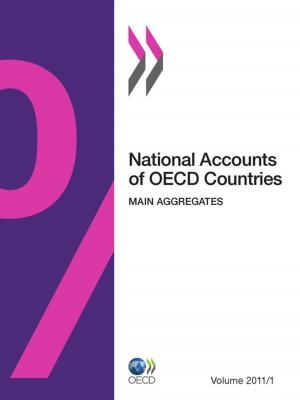Open for Business
Migrant Entrepreneurship in OECD Countries
Nonfiction, Social & Cultural Studies, Political Science, Politics, Social Services & Welfare| Author: | Collective | ISBN: | 9789264095830 |
| Publisher: | OECD | Publication: | November 29, 2010 |
| Imprint: | OECD | Language: | English |
| Author: | Collective |
| ISBN: | 9789264095830 |
| Publisher: | OECD |
| Publication: | November 29, 2010 |
| Imprint: | OECD |
| Language: | English |
Migrants contribute to the economic growth of their host countries in many ways, bringing new skills and competencies with them and helping to reduce labour shortages. An aspect that has received only limited attention up to now is migrants’ contribution to entrepreneurial activity and employment creation in their host countries. In OECD countries, entrepreneurship is slightly higher among immigrants than natives and the total number of persons employed in migrant businesses is substantial, although the survival rate of these businesses is often lower than that of their native counterparts. Migrant entrepreneurship has gone beyond traditional ethnic businesses, into a wide range of sectors and innovative areas.
Greater knowledge of migrant entrepreneurship is essential if policy makers are to better support migrant enterprises and their role in economic growth and job creation. In addition, increasing awareness of the positive role that migrants can play as entrepreneurs could contribute to a more balanced public debate on immigration. Taking a cross-country perspective, this publication sheds light on these issues and more, discussing policy options to foster the development and success of migrant businesses. It is a compilation of papers presented at a June 2010 conference organised by the OECD Secretariat, with the financial support of the Swedish and Turkish authorities, and the Dutch-Turkish Businessmen Association (HOTIAD).
Migrants contribute to the economic growth of their host countries in many ways, bringing new skills and competencies with them and helping to reduce labour shortages. An aspect that has received only limited attention up to now is migrants’ contribution to entrepreneurial activity and employment creation in their host countries. In OECD countries, entrepreneurship is slightly higher among immigrants than natives and the total number of persons employed in migrant businesses is substantial, although the survival rate of these businesses is often lower than that of their native counterparts. Migrant entrepreneurship has gone beyond traditional ethnic businesses, into a wide range of sectors and innovative areas.
Greater knowledge of migrant entrepreneurship is essential if policy makers are to better support migrant enterprises and their role in economic growth and job creation. In addition, increasing awareness of the positive role that migrants can play as entrepreneurs could contribute to a more balanced public debate on immigration. Taking a cross-country perspective, this publication sheds light on these issues and more, discussing policy options to foster the development and success of migrant businesses. It is a compilation of papers presented at a June 2010 conference organised by the OECD Secretariat, with the financial support of the Swedish and Turkish authorities, and the Dutch-Turkish Businessmen Association (HOTIAD).















